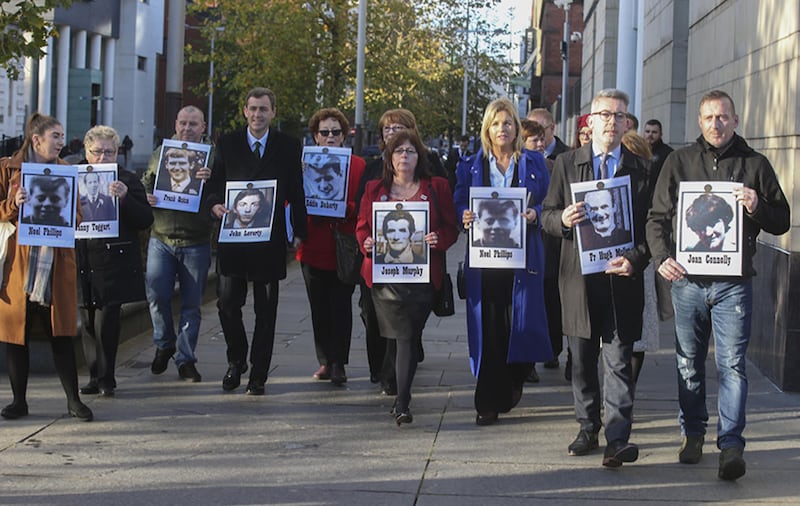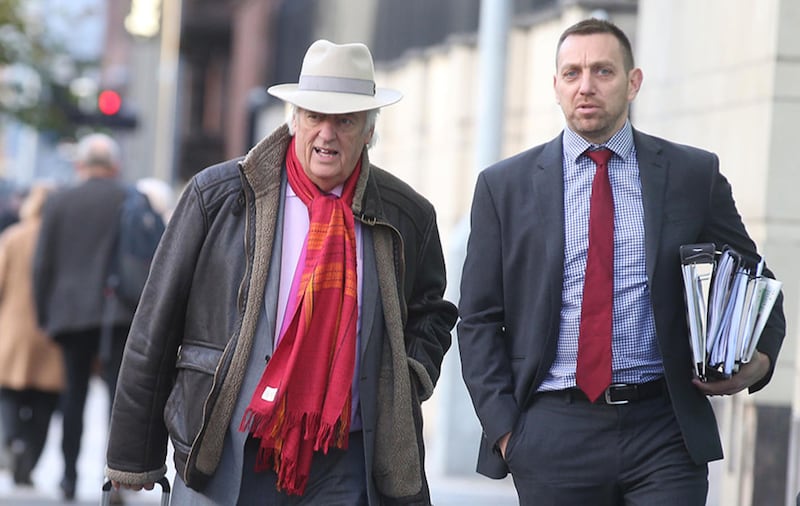RELATIVES of 10 people killed in Ballymurphy in 1971 have been giving evidence as the inquest into their deaths continues in Belfast.
Patsy Mullan, a brother of Fr Hugh Mullan who was killed as he was trying to help a wounded man, described him as "very helpful and kind".
In a video statement played to court, Mr Mullan described the moment he discovered his 38-year-old brother had been killed.
He said: "I listened to all the news reports and later that night I heard a priest had been shot in Ballymurphy. I knew it would be him. So I went to my mother's and told her he had been shot but that he was ok. I wasn't sure if he was dead.
"When I was later told that he was dead, I phoned our doctor and asked him to come to be with my mother as I didn't know how she would cope with this news.
"She was in a terrible state and had to be sedated."
Fr Hugh Mullan's mother and sister"cried for him until the day they died, his niece Geraldine McGrattan told the #BallymurphyMassacre inquest today @irish_news pic.twitter.com/qAlRlq59aq
— Bimpe Archer (@BimpeIN) November 13, 2018
Fr Mullan's niece, Geraldine McGrattan said: "When he died, it was so unbelievable that another human being could take the life of this special person who would never have hurt anyone, who would happily help friends and strangers alike. I have seen people come to his door and leave much happier and comforted with his help.
"My grandmother was devastated, my own mother was in shock, neither woman ever fully recovered from his untimely and cruel death and both would talk of him and cry for him right to the end of their lives.
"As a family we want this inquest to prove that my uncle was not a gunman as was stated in some of the newspapers at the time. That he was an innocent priest going about his pastoral duties.
"We want to know the truth about what happened."
Fr Mullan's cousin, Gabriel Ellison said: "I think of Fr Hugh as a very kind person who had a great brain and was very sincere.
Pat Quinn today told the #BallymurphyMassacre inquest how his brother Frank's death devastated the family @irish_news pic.twitter.com/JxIKL94Sfq
— Bimpe Archer (@BimpeIN) November 13, 2018
"Coming from a seafaring background, I feel enhanced by his vocation.
"Also my mother was a strong influence in his decision to become a priest. I remember her talking to him about it.
"When he would come home from his studies he would take me out sailing his witchcraft around Stranford Lough."
The brother of 19-year-old Frank Quinn, who was shot dead after trying to help a wounded man, said he was watching the news when they heard a priest and a young man had been shot dead in the Ballymurphy area.
Pat Quinn, who was accompanied by another brother, Liam, in court said: "My mother said 'someone is going to have a sore heart tomorrow'. She didn't know the tragedy was coming to our door.
"The next morning, I was lying in bed. I was off on school holidays, my daddy was away to work and my mummy was working in the Monarch laundry part-time.
"I heard banging on the front door and as I came down the stairs I could see my daddy through the glass door. I opened the door and I saw my daddy crying. He was distraught.
"I said 'daddy, what's wrong?'. He walked past me and sat on the stairs and said 'Frank's been shot'. I said 'was he wounded? Was he wounded?' and he said "no, he's dead'.
"Those three words changed me and my family's lives forever. My mother was brought home from work. She was like a ghost. It was like hell on earth that this was happening to our family."
Angela Nolan, the daughter of Frank Quinn said: "So many memories that we didn't get to make because someone decided that it was ok to take him from us, because he was a kind human being he went to help others. I have always been proud of his bravery. Many a man would have walked away.
"Our loss was heartbreaking.
"Growing up I could see how my friends had the protection of their daddy being at home. I was jealous of the daddy's girls and who knows how many more siblings we may have had."
A cross party delegation of senators are attending the second day of the Ballymurphy inquests to show solidarity with the bereaved families.
The representatives from Seanad Éireann met with relatives outside the coroner's court in Belfast ahead of heading inside to observe proceedings in the high profile case.
The long-awaited inquests are examining the deaths of 10 people killed during shooting incidents involving the British Army in the Ballymurphy area of west Belfast in 1971.
Representatives from Sinn Féin, Fine Gael, Fianna Fáil, the Labour party and an independent member of the Seanad travelled to Belfast for the hearing.
Read More:
- Ballymurphy families prepare for another season of suffering as inquest finally begins
- Ballymurphy inquest difficulties 'exacerbated by loss of records'
- Mixed emotions as 'Ballymurphy Massacre' inquest gets under way
- Neighbours star 'Madge Bishop' voices support for Ballymurphy Massacre families at Melbourne rally
- New potential witness to Ballymurphy massacre emerges
Sinn Féin's Niall Ó Donnghaile and Rose Conway Walsh, Fine Gael's Frank Feighan, Fianna Fail's Mark Daly and independent Frances Black met with family members ahead of the hearing.
Labour's Ged Nash was due to attend court later today.
Mr Ó Donnghaile said: "It is a significant morning for us that we have such a cross party and indeed such a nationally representative group of senators come here to observe proceedings at the Ballymurphy inquest, but to primarily re-engage and engage with the Ballymurphy families to continue showing solidarity with them, to hear their stories and to the ensure them of our support, the Seanad and indeed the broader Oireachtas's support for them in their campaign and during what is going to be an arduous number of months for them."
Yesterday, the court heard the families' contention that the shootings were the result of "illegitimate, unjustified and indiscriminate use of force by the [British] Army".
Inquests investigating the shooting incidents that unfolded over three days in August 1971, referred to as the Ballymurphy Massacre by bereaved relatives, are expected to last for months.
In 2011, Attorney General John Larkin directed that new inquests be heard after a long campaign by family members who claimed the original coronial probes were inadequate.
The shootings took place as the British Army moved into republican strongholds to arrest IRA suspects after the introduction by the Stormont administration of the controversial policy of internment without trial.
Soldiers have long been held responsible for killing all 10 in Ballymurphy between August 9-11 1971, but the accepted narrative became clouded earlier this year when former members of the paramilitary UVF came forward to claim their organisation was also involved.
Yesterday, Counsel for coroner Sean Doran QC outlined some of the evidence that will be examined throughout the inquests.
He said each individual incident and death will require "careful scrutiny".

In what he described as a "very broad observation" on the core issues, he said: "The narrative of the military is legitimate use of force was used at a time of heightened tension and response to specific threats."
He said this ran contrary to the Ballymurphy families, who say the deaths resulted from "illegitimate, unjustified and indiscriminate use of force by the army on civilians".
The families claim the military action resulted in the deaths of 10 "entirely innocent civilians".
Mr Doran said the original investigations into the deaths were "very limited", adding that there are multiple examples of failure to get witness accounts and examples that show forensic opportunities were missed.
Continuing his opening statement today, Mr Doran outlined details around the UVF's controversial claim of involvement.
The court was told that a UVF sniper was active near Ballymurphy at the time of the 10 killings in August 1971.
Mr Doran said no information as to which of the deaths may have been caused by the sniper had been offered.
In May this year, the coroner's service received correspondence from a solicitor representing an interlocutor who claimed he had information about the possible involvement of the UVF.

The interlocutor, known as Witness X, said he had spoken to people he described as veterans of the UVF.
He said that information provided identified a UVF sniper, who is now dead, who was active in the vicinity of where the shootings took place and may have caused some of the deaths.
It is understood the man named by the organisation is a now deceased UVF member called Tommy West.
Mr Doran told the court that Witness X claims he was told a Mauser rifle had been used by the sniper.
The barrister also described the extensive work the coroner's service has been carrying out for the inquests.
He said that they have requested 127 military witness statements and around 800 soldiers have been identified as potentially being able to assist the inquest.








